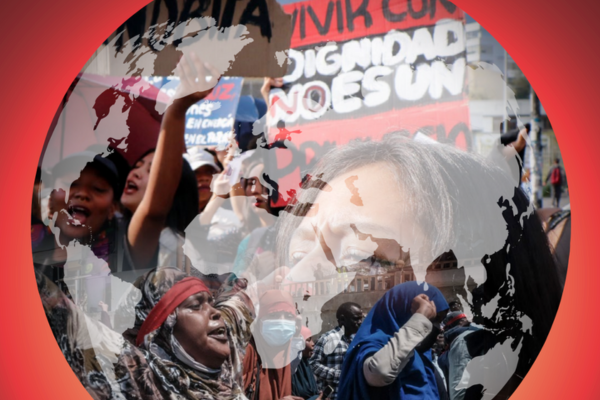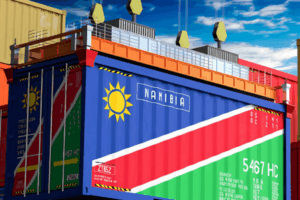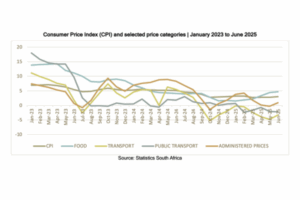The 2025 ITUC Global Rights Index, reveals “a stark and worsening crisis for workers and unions.”
Just seven countries now hold the top rating for respecting workers’ rights, compared with nearly 40 at the bottom. Argentina, Costa Rica, Georgia, Italy, Mauritania, Niger, and Panama saw their ratings worsen, while Australia, Mexico, and Oman showed improvement.
Three out of five global regions experienced worsening conditions over the past year, with Europe and the Americas recording their worst scores since the Index began in 2014.
The assault on workers’ rights is happening worldwide.
In Africa, Nigerian security forces raided union headquarters and detained the union president on false “terrorism” charges, putting Nigeria among the 10 worst countries for workers for the first time.
In Asia-Pacific, Cambodia convicted a union president for speaking out online, while in Malaysia, global packaging firm Amcor unfairly dismissed a union leader during an organising campaign.
In Europe, Italy’s rating fell as its far-right government restricted strikes and interfered with union activities. In Sweden, Tesla illegally replaced striking workers rather than negotiating with them.
In Latin America, Panama’s government violently cracked down on construction workers’ protests, arresting 514 people, including breastfeeding mothers, while freezing union bank accounts.
“This isn’t happening by accident. We are witnessing a coordinated coup against democracy by billionaires and their political allies who are rigging the system against working people. But together we will expose their plans, and give voice to those on the frontlines in the fight for democracy. We can build economies that put workers first, not corporate profits. And we can make sure global institutions answer to the people they are supposed to serve — us.”
— Luc Triangle, ITUC General Secretary.
Violations of workers rights
Workers had no or reduced access to justice in 72% of countries, a sharp increase from 65% in 2024. In Cameroon, a seasonal worker was killed by police during a demonstration by sugar workers for better pay and safer conditions.
Attacks on the rights to free speech and assembly were reported in 45% of countries – a record high for the Index and an increase from 43% in 2024. In Benin, workers were arrested during May Day celebrations, highlighting the growing repression of public expression.
The right to strike was violated in 87% of countries, unchanged from the 2024 high. In Cameroon, a seasonal worker was killed by police during a demonstration by SOSUCAM sugar workers for better pay and safer conditions.
Legal registration of unions was impeded in 74% of countries, unchanged from 2024 and the worst level since the Index began. Some 600 traffic services workers in Kenya were denied the right to form a union due to the misclassification of their roles and restrictions on union membership.
Collective bargaining rights were restricted in 80% of countries, up from 79% in 2024.
Authorities arrested or imprisoned workers in 71 countries (47%), a slight improvement but nearly double the 2014 rate.
Workers in three out of every four countries were denied the right to freedom of association and to organise, unchanged from 2024.
Violence against workers occurred in 26% of countries, down from 29% in 2024. Armed bandits attacked the home of a union leader in Haiti, and thugs violently forced five unionists out of a May Day event at a lithium mine in Zimbabwe.
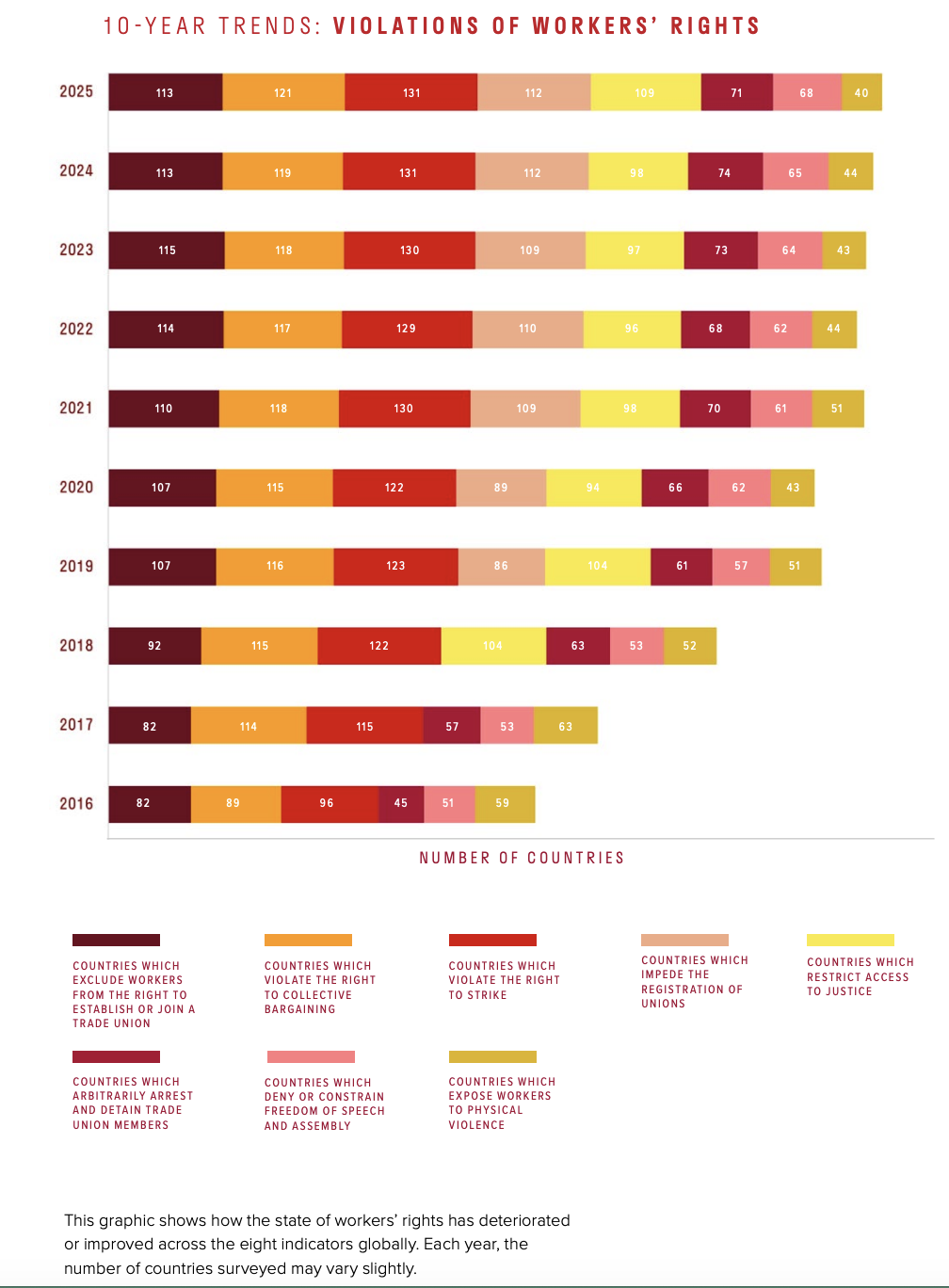
The 10 worst countries for workers in 2025
Each year, the Global Rights Index rates countries depending on their compliance with collective, internationally recognised labour rights and records violations by governments and employers. These are the 10 worst countries for working people: Bangladesh, Belarus, Ecuador, Egypt, Eswatini, Myanmar, Nigeria, Philippines, Tunisia, and Türkiye.
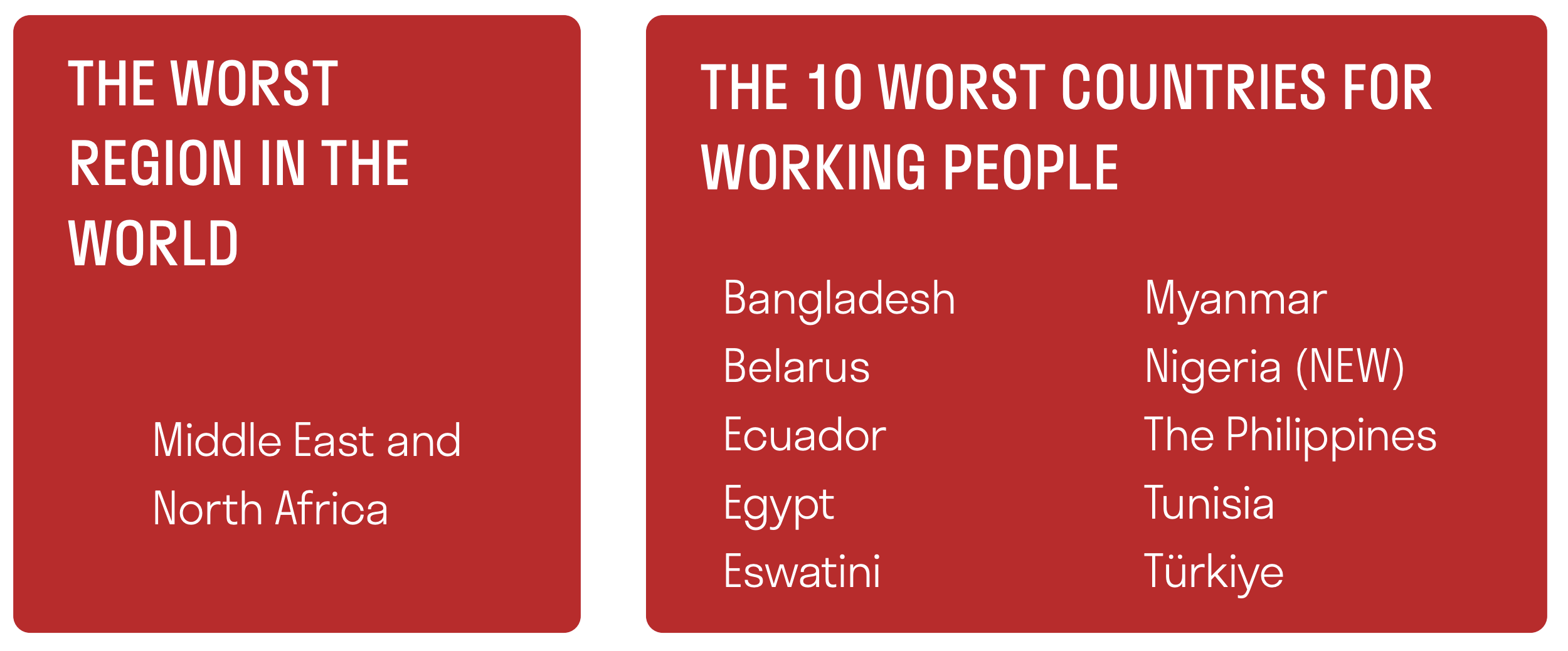
Africa region overview
Africa recorded its second-lowest score ever, slipping from 3.88 in 2024 to 3.95 in 2025. This reflects widespread, systematic violations of workers’ rights across the region, with 90% of countries restricting the rights to strike, bargain collectively, and join or form unions. For the first time, Nigeria has entered the top 10 worst countries for workers.
Most African workers, especially in the informal sector, lack labour protections. In 93% of countries, the rights to strike, bargain, or form unions are violated. While fewer countries reported violence, some union activists were killed in Cameroon and South Africa.
Strikes and protests were suppressed in Cameroon, Kenya, Mauritania, and South Africa. Employers sabotaged union efforts in Botswana, Ethiopia, Guinea, Kenya, Lesotho, Liberia, and Senegal. In Nigeria, Eswatini, and Zimbabwe, trade unionists faced repression, while authorities in Eswatini, Guinea-Bissau, and Zimbabwe banned protests and assemblies.
Military juntas in West Africa, including Burkina Faso, Chad, Gabon, and Mali, blocked union activities. Conflicts in South Sudan and Sudan have left millions needing aid and devastated workers’ livelihoods. Violence in eastern Democratic Republic of Congo has displaced 700,000 people, overwhelmed hospitals and food supplies, and caused immense suffering among civilians and workers.
Unions pushing back
Despite concerted attacks on workers’ rights and interests, unions worldwide are fighting back using collective power to improve working conditions, reclaim civil liberties, and resist state and corporate impunity.
Multinationals often lead anti-union practices and violate workers’ rights, especially abroad. Holding them accountable is challenging due to gaps in international laws and enforcement. The report highlights examples of unions confronting multinational companies.
Côte d’Ivoire
DHL employees in Côte d’Ivoire elected union representation for the first time in May 2024, after years of organising by SYNAPOSTEL (a UNI global union affiliate). This breakthrough was supported by Germany’s 2023 due diligence law, requiring employers to uphold human rights and environmental standards in their supply chains. Previous attempts in 2016 failed, but mediation and the creation of the DHL Alliance union network in 2019, along with an OECD protocol signed by DHL, UNI, and the ITF, paved the way. The National Union of DHL Workers Côte d’Ivoire (SYNAT DHL CI) was officially established in 2022.
Ghana
After over 1,000 workers faced precarious conditions and unpaid wages since January 2024, the Ghana Mine Workers Union (GMWU) successfully pushed authorities to cancel the foreign-owned licence for Bogoso-Prestea gold mine. UK-based Future Global Resources (FGR), which owns 90% of the mine, failed to invest or pay workers. The Ministry of Lands and Natural Resources terminated the licence on 18 September 2024.
Mauritius
The Confederation of Mauritian Trade Unions (CTSP) fights to protect migrant workers, mainly in manufacturing, who face debt bondage and intimidation. Migrants from countries like Bangladesh, China, India, and Nepal receive free union membership and support in their native languages. The union also fights against unfair deportations through the Migrant Resource Centre, which is backed by international unions, including IndustriALL.
Full report: The 2025 ITUC Global Rights Index


